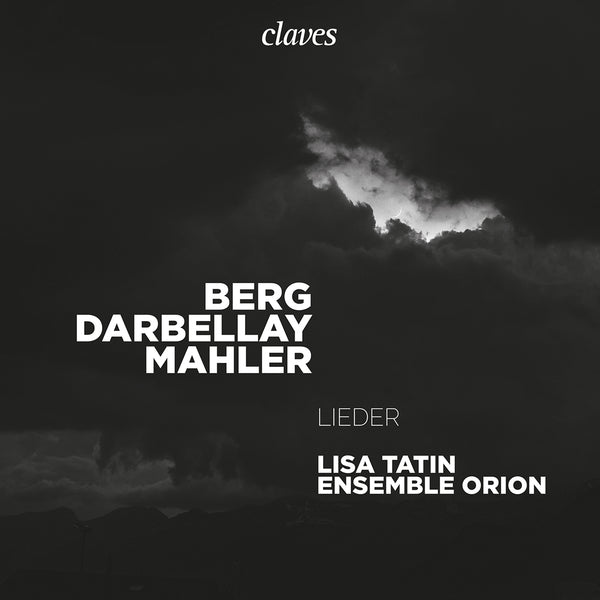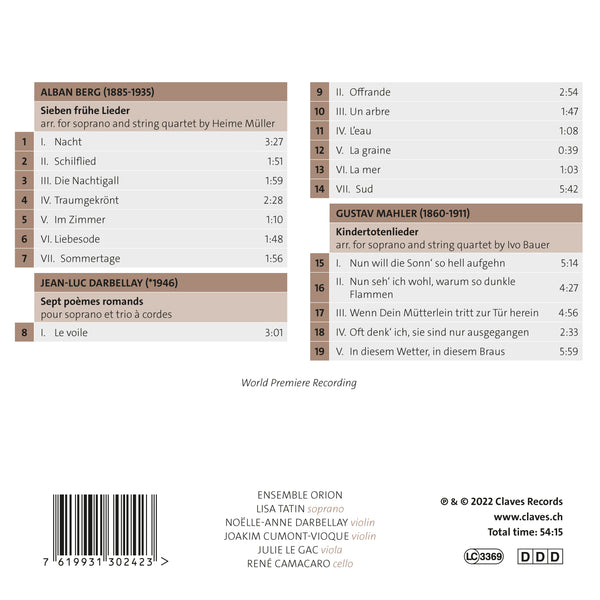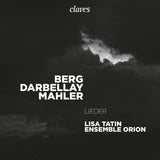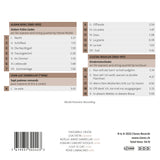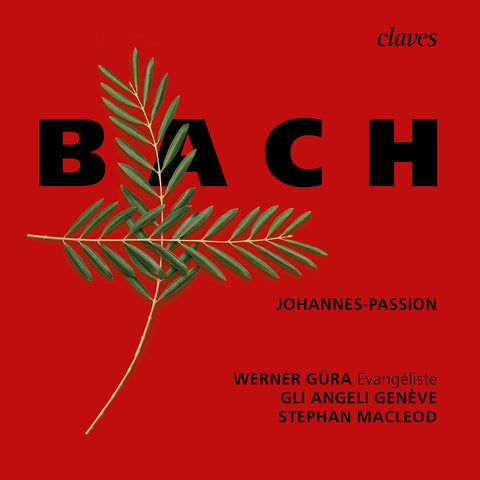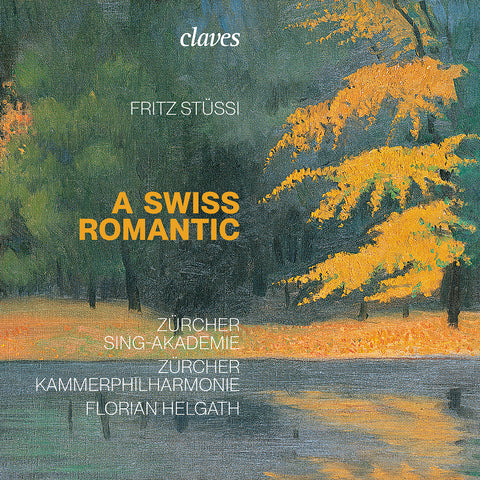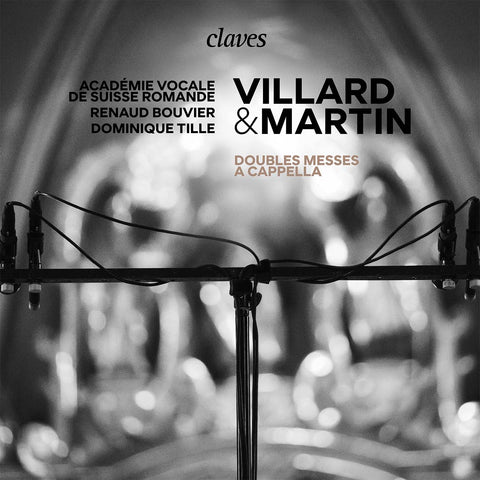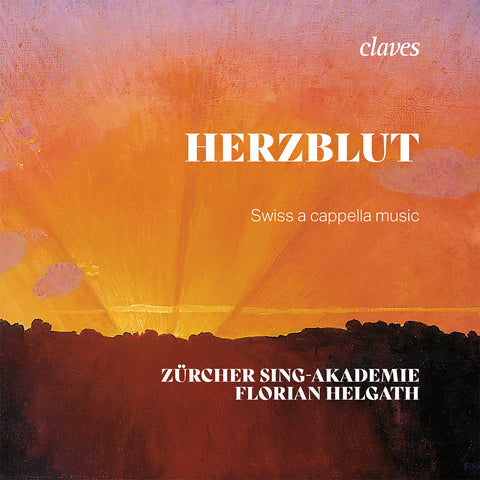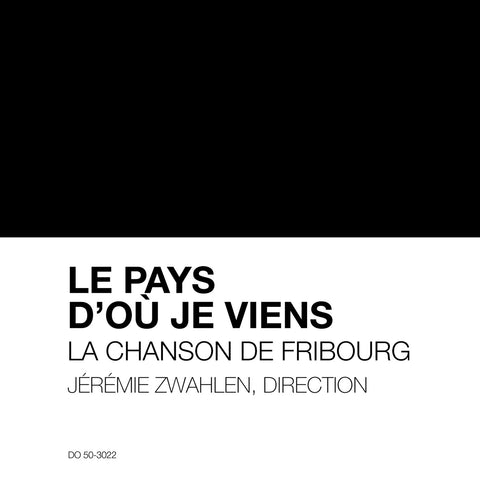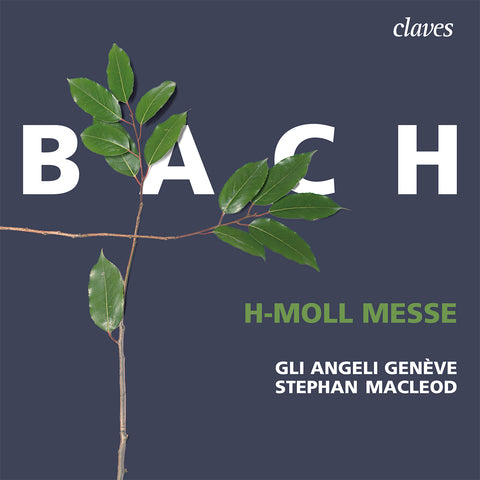(2022) Berg Darbellay Mahler - Lieder
Category(ies): Chamber Modern Oper vocal
Instrument(s): Cello Viola Violin
Vocal(s): Soprano
Main Composer: Gustav Mahler
Ensemble: Ensemble Orion
CD set: 1
Catalog N°:
CD 3024
Release: 11.03.2022
EAN/UPC: 7619931302423
This album is now on repressing. Pre-order it at a special price now.
CHF 18.50
This album is no longer available on CD.
This album has not been released yet. Pre-order it from now.
CHF 18.50
This album is no longer available on CD.
CHF 18.50
VAT included for Switzerland & UE
Free shipping
This album is no longer available on CD.
VAT included for Switzerland & UE
Free shipping
This album is now on repressing. Pre-order it at a special price now.
CHF 18.50
This album is no longer available on CD.
This album has not been released yet.
Pre-order it at a special price now.
CHF 18.50
This album is no longer available on CD.
CHF 18.50
This album is no longer available on CD.
BERG DARBELLAY MAHLER - LIEDER
Berg, Darbellay, Mahler
The idea that music begins where language ends goes back to literary Romanticism. In 1835, Joseph von Eichendorff was tracking the “song in all things” with his dowsing rod (“Wünschelrüte” in German, as is entitled one of his most famous poems), searching for the “magic word” that would be capable of transforming the world into song. Only a language that itself becomes music can speak about what it must otherwise keep silent. Thus the credo of romantic poetry.
But if language itself becomes music, what is music then to become? In the musical genre of the Lied, in which words and music are twinned, in which meaning and sound support, ensnare and sometimes infiltrate each other, the composers themselves answer this question. Every art song is basically a meditation on the relationship between music and language.
This is particularly true of the three Lieder cycles on this CD. The song settings by Gustav Mahler, Alban Berg and Jean-Luc Darbellay all revolve around an absence revealed by the language – and to which music provides an acoustic presence. Covering a period of eight decades, the three composers approach the fateful intertwining of love, loss and memory, finding a suitable musical language. The three Mahler, Berg and Darbellay song cycles presented by the Ensemble Orion are arrangements for soprano and string quartet or trio. This is the first recording of the works in a chamber music setting.
Silvan Moosmüller
(Translation: Michelle Bulloch – Musitext)
Read more in the booklet & German texts
***
Lisa Tatin, soprano
Circus, acting, modern ballet, theatre, opera – all these belong to Lisa Tatin’s career. After studying at a circus and dance school, she continued her vocal training at the Lyon Conservatory and the HEMU in Fribourg/Lausanne with Christian Immler. Further studies led her to Prof. Lina Maria Åkerlund at the Zurich University of the Arts ZHdK.
Thanks to her versatility and joy of discovery, she is now a much-acclaimed soprano.
Lisa Tatin has sung various roles in Mozart operas (Serpetta, Blondchen, Despina). Her talent for acting has also led her to personify characters such as Ernestine, Adele, Serpina or Livietta in the opera buffa repertoire. Over the past years, Lisa Tatin has performed contemporary works that combine alternative forms of singing with choreographic elements. She teamed up with Julie Beauvais, for instance, to associate a solo movement performance with baroque and contemporary music in Sunbathing in My Tears. With the Arcola Theatre London, she performed as a dancing singer in a staged version of Buxtehude’s Jesu Membra Nostri.
Lisa Tatin is a winner of the Migros Kulturprozent Prize 2014/15. She also won 1st prize in the ZHdK contemporary music competition in 2015 and was a finalist at the Concours Nicati 2017. In spring 2022, she will make her debut at Zurich Opera in a work by Stefan Wirth.
lisatatin.com
Read more in the booklet & German texts
***
Ensemble Orion
Violinist Noëlle-Anne Darbellay and her brother, horn player Olivier Darbellay, form the core of the Ensemble Orion.
Surrounded by top-class musicians, these internationally active siblings play in various formations. The repertoire covers baroque works – played on period instruments – up to contemporary music. The “family band” also includes composer Jean-Luc Darbellay, whose pieces are regularly featured in the ensemble’s programmes.
The Ensemble Orion has performed throughout Europe, North America and Asia. It has been a guest in renowned concert series and festivals, including the Julliard School New York, the Goethe- Institute in Tokyo, the Deutschlandfunk series at the Arithmeum Bonn, the Händel-Haus Halle, the Philharmonie Luxembourg, the Grand-Théâtre d’Angers, the Sion Festival, the Swiss Chamber Music Festival, the Murten Classics, the World New Music Days, the Schubertiade Espace2, the International Music Festival Odessa and the Torshavn Summer Festival on the Faroe Islands, as well as at important Art Institutions such as the Albertina Vienna.
The concerts are often supplemented by educational events, masterclasses and exchanges with ensembles from abroad.
For the three song cycles recorded on this CD, Noëlle-Anne Darbellay is joined by soprano Lisa Tatin, violinist Joakim Cumont-Vioque, violist Julie Le Gac and cellist René Camacaro.
Read more in the booklet & German text
Musicians
Lisa Tatin, soprano
Noëlle-Anne Darbellay, violin
Joakim Cumont-Vioque, violin
Julie Le Gac, viola
René Camacaro, cello
***
Smart links
REVIEWS
« Formation polymorphe, l’Ensemble Orion a pour principe d’explorer les répertoires les plus variés. Parfois aussi, c’est la musique qui se transforme au contact de cet ensemble, ici escorté par la jeune soprano Lisa Tatin pour son premier disque : dans les trois cycles enregistrés, l’orchestre ou les vents qui accompagnent la voix sont remplacés par un quatuor ou un trio à cordes. Les auteurs des remarquables arrangements mobilisent toute la palette de cet effectif pour donner à chaque œuvre son climat propre. Le programme est un triptyque centré sur l’amour et la perte ; deux cycles emblématiques du début du XXe siècle, les Sept lieder de jeunesse de Berg et les Kindertotenlieder de Mahler, encadrent les Sept poèmes romands (1986), inédits au disque, de Jean-Luc Darbellay. [..] » - Nicolas Boiffin, juillet 2022
« [..] Mais la perle de cet enregistrement est bien le cycle de Sept poèmes romands de 1986, de Jean-Luc Darbellay, compositeur qui possède des liens familiaux étroits avec l’Ensemble Orion. Lisa Tatin et le trio à cordes mettent en valeur, par leur expressivité délicate, cette oeuvre remarquable au caractère méditatif, où absence et présence s’enchevêtrent et s’estompent dans le silence sur des magnifiques textures limpides et des incursions en territoires dodécaphoniques. » - Gianluigi Bocelli, avril 2024
« Bergs «Sieben frühe Lieder» und Mahlers «Kindertotenlieder» in kleinster Kammermusikbesetzung – Sopran und Streichquartett bzw. Streichtrio – das mag zunächst nach Notlösung klingen, wenn Mittel oder Platz fehlen. Nichts weniger als das: Lisa Tatin und die Streicher des Ensemble Orion verleihen diesen letztromantischen und frühmodernen Werken eine Intensität, die in ihrer Art weder vom Orchester noch vom Klavier zu bekommen ist. Das liegt einesteils an den Instrumentalisten, die vibrierende Energie einbringen, ohne indessen zu überzeichnen. [..] Eine faszinierende Scheibe, die ein oberflächliches Zuhören kategorisch ausschliesst. » - Stephan Thomas, August 2022
« Wiener Schmäh und spirituelle Klänge? Sind meist nicht das Erste, woran man bei Musik des 20. Jahrhunderts denkt. Ausser, man hat es mit dem Schweizer Ensemble Orion zu tun. In der Formation als Streichquartett versammelt das Ensemble Lieder von Alban Berg, Gustav Mahler und dem Schweizer Komponisten Jean-Luc Darbellay zu einem Album voller Cellowärme und sphärisch-ruhiger Klänge, die den Sopran von Lisa Tatin umfangen, umspielen und umhüllen, so dass aus den Stimmen ein schimmernder Gesamtklang entsteht, in dem einmal der Gesang, einmal die Begleitung obenauf schwingt. » - Anna Kardos, Juni 2022
“[..] The Swiss soprano Lisa Tatin has completely won me over to her ravishing vocalism with her exceptionally fine vocalism and imagination, while the accompaniment by the Ensemble Orion, also from Switzerland, fits in seamlessly. In addition, the Sept poèmes romands (for soprano and string trio) were a real ear-opener for me: the seven songs are conceived with great refinement (the texts are by the Waadtland lyricist François Rossel), and the musical discourse convincingly reflects the images of love and loss, night, dream and nature evoked in the text. The work dates from 1986, so almost sixty years after the publication of Berg's Sieben frühe Lieder, but apart from the largely shared poetic theme, the musical similarities between the two works are also striking. This is another aspect that Tatin and the Orion bring to the fore with great style. The soprano moves like a versatile chameleon seemingly effortlessly through this strongly contrasting program. Her interpretative gifts reminded me of those of Juliane Banse, no small compliment. [..]” - Aart van der Wal, June 2022
Berg, Darbellay, Mahler
The idea that music begins where language ends goes back to literary Romanticism. In 1835, Joseph von Eichendorff was tracking the “song in all things” with his dowsing rod (“Wünschelrüte” in German, as is entitled one of his most famous poems), searching for the “magic word” that would be capable of transforming the world into song. Only a language that itself becomes music can speak about what it must otherwise keep silent. Thus the credo of romantic poetry.
But if language itself becomes music, what is music then to become? In the musical genre of the Lied, in which words and music are twinned, in which meaning and sound support, ensnare and sometimes infiltrate each other, the composers themselves answer this question. Every art song is basically a meditation on the relationship between music and language.
This is particularly true of the three Lieder cycles on this CD. The song settings by Gustav Mahler, Alban Berg and Jean-Luc Darbellay all revolve around an absence revealed by the language – and to which music provides an acoustic presence. Covering a period of eight decades, the three composers approach the fateful intertwining of love, loss and memory, finding a suitable musical language. The three Mahler, Berg and Darbellay song cycles presented by the Ensemble Orion are arrangements for soprano and string quartet or trio. This is the first recording of the works in a chamber music setting.
Silvan Moosmüller
(Translation: Michelle Bulloch – Musitext)
Read more in the booklet & German texts
***
Lisa Tatin, soprano
Circus, acting, modern ballet, theatre, opera – all these belong to Lisa Tatin’s career. After studying at a circus and dance school, she continued her vocal training at the Lyon Conservatory and the HEMU in Fribourg/Lausanne with Christian Immler. Further studies led her to Prof. Lina Maria Åkerlund at the Zurich University of the Arts ZHdK.
Thanks to her versatility and joy of discovery, she is now a much-acclaimed soprano.
Lisa Tatin has sung various roles in Mozart operas (Serpetta, Blondchen, Despina). Her talent for acting has also led her to personify characters such as Ernestine, Adele, Serpina or Livietta in the opera buffa repertoire. Over the past years, Lisa Tatin has performed contemporary works that combine alternative forms of singing with choreographic elements. She teamed up with Julie Beauvais, for instance, to associate a solo movement performance with baroque and contemporary music in Sunbathing in My Tears. With the Arcola Theatre London, she performed as a dancing singer in a staged version of Buxtehude’s Jesu Membra Nostri.
Lisa Tatin is a winner of the Migros Kulturprozent Prize 2014/15. She also won 1st prize in the ZHdK contemporary music competition in 2015 and was a finalist at the Concours Nicati 2017. In spring 2022, she will make her debut at Zurich Opera in a work by Stefan Wirth.
lisatatin.com
Read more in the booklet & German texts
***
Ensemble Orion
Violinist Noëlle-Anne Darbellay and her brother, horn player Olivier Darbellay, form the core of the Ensemble Orion.
Surrounded by top-class musicians, these internationally active siblings play in various formations. The repertoire covers baroque works – played on period instruments – up to contemporary music. The “family band” also includes composer Jean-Luc Darbellay, whose pieces are regularly featured in the ensemble’s programmes.
The Ensemble Orion has performed throughout Europe, North America and Asia. It has been a guest in renowned concert series and festivals, including the Julliard School New York, the Goethe- Institute in Tokyo, the Deutschlandfunk series at the Arithmeum Bonn, the Händel-Haus Halle, the Philharmonie Luxembourg, the Grand-Théâtre d’Angers, the Sion Festival, the Swiss Chamber Music Festival, the Murten Classics, the World New Music Days, the Schubertiade Espace2, the International Music Festival Odessa and the Torshavn Summer Festival on the Faroe Islands, as well as at important Art Institutions such as the Albertina Vienna.
The concerts are often supplemented by educational events, masterclasses and exchanges with ensembles from abroad.
For the three song cycles recorded on this CD, Noëlle-Anne Darbellay is joined by soprano Lisa Tatin, violinist Joakim Cumont-Vioque, violist Julie Le Gac and cellist René Camacaro.
Read more in the booklet & German text
Musicians
Lisa Tatin, soprano
Noëlle-Anne Darbellay, violin
Joakim Cumont-Vioque, violin
Julie Le Gac, viola
René Camacaro, cello
***
Smart links
REVIEWS
« Formation polymorphe, l’Ensemble Orion a pour principe d’explorer les répertoires les plus variés. Parfois aussi, c’est la musique qui se transforme au contact de cet ensemble, ici escorté par la jeune soprano Lisa Tatin pour son premier disque : dans les trois cycles enregistrés, l’orchestre ou les vents qui accompagnent la voix sont remplacés par un quatuor ou un trio à cordes. Les auteurs des remarquables arrangements mobilisent toute la palette de cet effectif pour donner à chaque œuvre son climat propre. Le programme est un triptyque centré sur l’amour et la perte ; deux cycles emblématiques du début du XXe siècle, les Sept lieder de jeunesse de Berg et les Kindertotenlieder de Mahler, encadrent les Sept poèmes romands (1986), inédits au disque, de Jean-Luc Darbellay. [..] » - Nicolas Boiffin, juillet 2022
« [..] Mais la perle de cet enregistrement est bien le cycle de Sept poèmes romands de 1986, de Jean-Luc Darbellay, compositeur qui possède des liens familiaux étroits avec l’Ensemble Orion. Lisa Tatin et le trio à cordes mettent en valeur, par leur expressivité délicate, cette oeuvre remarquable au caractère méditatif, où absence et présence s’enchevêtrent et s’estompent dans le silence sur des magnifiques textures limpides et des incursions en territoires dodécaphoniques. » - Gianluigi Bocelli, avril 2024
« Bergs «Sieben frühe Lieder» und Mahlers «Kindertotenlieder» in kleinster Kammermusikbesetzung – Sopran und Streichquartett bzw. Streichtrio – das mag zunächst nach Notlösung klingen, wenn Mittel oder Platz fehlen. Nichts weniger als das: Lisa Tatin und die Streicher des Ensemble Orion verleihen diesen letztromantischen und frühmodernen Werken eine Intensität, die in ihrer Art weder vom Orchester noch vom Klavier zu bekommen ist. Das liegt einesteils an den Instrumentalisten, die vibrierende Energie einbringen, ohne indessen zu überzeichnen. [..] Eine faszinierende Scheibe, die ein oberflächliches Zuhören kategorisch ausschliesst. » - Stephan Thomas, August 2022
« Wiener Schmäh und spirituelle Klänge? Sind meist nicht das Erste, woran man bei Musik des 20. Jahrhunderts denkt. Ausser, man hat es mit dem Schweizer Ensemble Orion zu tun. In der Formation als Streichquartett versammelt das Ensemble Lieder von Alban Berg, Gustav Mahler und dem Schweizer Komponisten Jean-Luc Darbellay zu einem Album voller Cellowärme und sphärisch-ruhiger Klänge, die den Sopran von Lisa Tatin umfangen, umspielen und umhüllen, so dass aus den Stimmen ein schimmernder Gesamtklang entsteht, in dem einmal der Gesang, einmal die Begleitung obenauf schwingt. » - Anna Kardos, Juni 2022
“[..] The Swiss soprano Lisa Tatin has completely won me over to her ravishing vocalism with her exceptionally fine vocalism and imagination, while the accompaniment by the Ensemble Orion, also from Switzerland, fits in seamlessly. In addition, the Sept poèmes romands (for soprano and string trio) were a real ear-opener for me: the seven songs are conceived with great refinement (the texts are by the Waadtland lyricist François Rossel), and the musical discourse convincingly reflects the images of love and loss, night, dream and nature evoked in the text. The work dates from 1986, so almost sixty years after the publication of Berg's Sieben frühe Lieder, but apart from the largely shared poetic theme, the musical similarities between the two works are also striking. This is another aspect that Tatin and the Orion bring to the fore with great style. The soprano moves like a versatile chameleon seemingly effortlessly through this strongly contrasting program. Her interpretative gifts reminded me of those of Juliane Banse, no small compliment. [..]” - Aart van der Wal, June 2022
Return to the album | Read the booklet | Composer(s): Gustav Mahler | Main Artist: Lisa Tatin
STUDIO MASTER (HIGH-RESOLUTION AUDIO)
Amethys Design
Cello
Chamber
Classica - Coup de coeur
Ensemble Orion
Gustav Mahler
High-resolution audio - Studio master quality
In stock
Jean-Luc Darbellay
Joakim Cumont-Vioque
Julie Le Gac
Lisa Tatin
Matthias Müller
Modern
Noëlle-Anne Darbellay
Opera vocal
René Camacaro
Soprano
Viola
Violin
World Premiere Recording
Amethys Design
Cello
Chamber
Classica - Coup de coeur
Ensemble Orion
Gustav Mahler
High-resolution audio - Studio master quality
In stock
Jean-Luc Darbellay
Joakim Cumont-Vioque
Julie Le Gac
Lisa Tatin
Matthias Müller
Modern
Noëlle-Anne Darbellay
Opera vocal
René Camacaro
Soprano
Viola
Violin
World Premiere Recording






